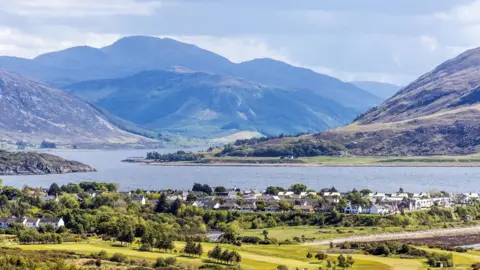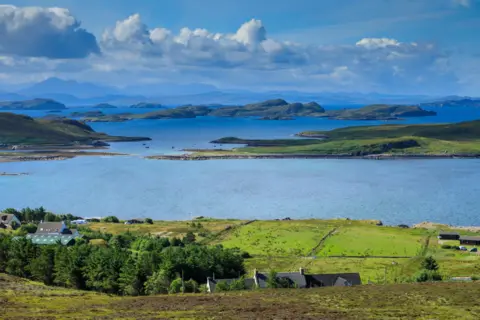Call for young to have legal right to live where they grew up
 Getty Images
Getty ImagesYoung people should have a legal right to live in the community where they grew up, says Community Land Scotland.
It said there was an "acute" shortage of affordable properties in rural areas.
The organisation said "Right to Live" should be written into legislation and sit alongside people's rights to food and education.
The Scottish government said it had delivered more than 10,000 affordable rural homes between April 2016 to March 2023, and had committed to building thousands more throughout Scotland.
Community Land Scotland's call forms part of its new vision to improve community landownership.
Development manager Linsay Chalmers said: "Many of the places where our members are based have plenty of jobs - and young people who want to stay and contribute - but there is nowhere affordable for them to live.
"This is decimating communities and leaving young people with little choice but to move away.
"A Right to Live would mean that the Scottish government would have to take a more strategic and creative approach to policy and legislation to ensuring that young people could stay in communities."
The organisation, which represents community landowners, said an ongoing review of community right to buy policy was among the opportunities it had to promote the idea.
 Emily MacMillan
Emily MacMillanEmily MacMillan, 22, lives in Achiltibuie in the west Highlands after moving there with her family from Glenelg in Lochalsh eight years ago.
She said it took her four years of fighting her case to secure an affordable home, a one bedroom flat in the small village near Ullapool.
Ms MacMillan said she was now at a stage where she wanted to own her own home with her partner in Achiltibuie, but the few properties available for sale are too expensive.
She said: "It's impossible for first-time buyers."
According to the latest Office for National Statistics figures the average price being paid by Highland first-time buyers is £172,000.
The Scottish average is £160,213.
Ms MacMillan said she knew of people who felt they had to move away to find homes.
She said: "That's the hard part about it as well, losing people your age because they can't stay.
"I am lucky to have my flat and feel almost guilty saying it is not big enough."
Ms MacMillan said her desire was to continue living in her local community.
"I have always lived on the west coast, and I am a very family-orientated person and I just want to be near my family," she said.
"Also it is a gorgeous place to live.
"I am quite an artistic person, I do a lot of paintings, and it is so inspiring living in a place like this.
"I like the small community as well. Everyone is very close and tight-knit and look out for each other. The support is something you don't find in large urban areas, I think."
She added: "The solution is never going to a simple one.
"The last council estate built here was over 10 years ago. It must have made a huge difference back then."
 Getty Images
Getty ImagesIn July, a report suggested teenagers were worried there was no future for them on Scotland's islands due to a lack of housing
A survey of 12 to 25-year-olds by Young Islanders Network (YIN) suggests 62% of respondents plan to leave their island homes when they are older because of a shortage of suitable accommodation.
Just 9% said they believed buying a home where they lived was affordable.
The Scottish government has a commitment to deliver 110,000 new affordable homes across Scotland.
It said at least 70% would be for social rent and 10% in rural and island communities.
The Scottish government said the pledge was backed by funds such as the Rural and Islands Housing Fund and Rural Key Workers Fund
Housing Minister Paul McLennan said: "We are working closely with regional, local and community partners to ensure that we collectively deliver a sustainable solution to the challenges affecting rural and island communities, including funding for local-led research and community initiatives.
"Through delivery of our Addressing Depopulation Action Plan, we are supporting local action to help communities retain the populations they need to thrive, which includes supporting young people to live and work in affected areas."
